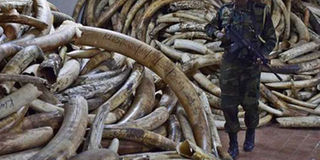Heads of State vow to fight poaching and ivory trade

A Kenya Wildlife Services ranger walks through a secure ivory stock room in Nairobi on March 21, 2016. President Uhuru Kenyatta, his Ugandan counterpart Yoweri Museveni and Gabon’s Ali Bongo noted that the killing of the ivory market will be the surest way to end poaching. PHOTO | CARL DE SOUZA | AFP
What you need to know:
- President Uhuru Kenyatta, his Ugandan counterpart Yoweri Museveni and Gabon’s Ali Bongo noted that the killing of the ivory market will be the surest way to end poaching.
- A new law imposes stiffer penalties on poachers and Today (Saturday) the country will set on fire 105 tonnes of ivory.
Three Heads of State have committed to fight poaching and push for the killing of the ivory market.
President Uhuru Kenyatta, his Ugandan counterpart Yoweri Museveni and Gabon’s Ali Bongo noted that the killing of the ivory market will be the surest way to end poaching.
President Kenyatta said he will ensure ivory is not only made worthless but it’s trade is banned.
“My government will push for a total ban of ivory trade during the 17th Convention on International Trade of Endangered Species (Cites) meeting in Johannesburg, South Africa in September. We will not sit and wait to be the generation that will see the decline of our wildlife,” President Kenyatta said Friday in Nanyuki, Laikipia County, during the inaugural Giants Club Summit.
Kenya has taken measures to combat elephant poaching and trade in ivory within and across the borders.
A new law imposes stiffer penalties on poachers and Today (Saturday) the country will set on fire 105 tonnes of ivory.
The three Heads of State are expected to discuss methods to fight poachers from the frontline, where rangers are out on patrol, to the court room and make declarations on specific steps their governments plan to take protect the elephant from extinction.
President Bongo said poaching has “made elephants refugees and this is worsening the human-wildlife conflict.”
President Museveni noted it was getting difficult to urge his citizens to co-exist with wildlife.
“We are very hard on poachers, we send them to heaven prematurely but the problem is my voters. They invade forests, wetlands, and farm on mountain slopes,” he said.
Earlier, Dr Richard Leakey, the chairman of the Kenya Wildlife Society, had noted that the ivory trade cannot thrive if there is no market.
“Kill the ivory market once and for all. Demand and ultimately the market for ivory is spurred by corruption and porous borders,” he noted.
According to him, making ivory worthless as it was done in 1989 when the price was devalued would greatly help.
The move led to the formation of Cites that banned ivory trade in 1989. “In 1989, ivory was about Sh30,000 a kilo, but its now Sh50,000. We need to fight the poachers hard, but we must fight the market too,” he said.
The summit preceded Saturday’s historic burning of about 105 tonnes ivory seized from poaching gangs.





